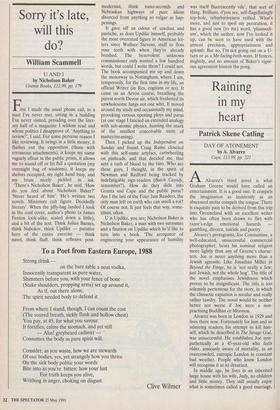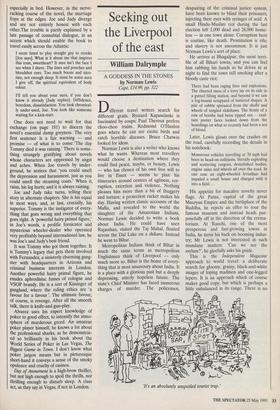Raining in my heart
Patrick Skene Catling
DAY OF ATONEMENT by A. Alvarez Cape, £13.99, pp. 221 A. Alvarez's third novel is what Graham Greene would have called an entertainment. It is a good one. It compels the imagination as insistently as an abscessed molar compels the tongue. There is exquisite pain to be derived from this trip into Greeneland with an excellent writer who has often been drawn to flirt with razor's-edge emotional hazards gambling, divorce, suicide and poetry.
Alvarez's protagonist, Joe Constantine, a well-educated, unsuccessful commercial photographer, bears his nominal religion more lightly than any of Greene's charac- ters. Joe is never anything more than a Jewish agnostic. Like Jonathan Miller in Beyond the Fringe, he is 'not really a Jew; just Jewish, not the whole hog'. The title of the novel emphasises Jewishness which proves to be insignificant. The title is too solemnly portentous for the story, in which the climactic expiation is secular and really rather tawdry. The novel would be neither better nor worse if Joe were a non- practising Buddhist or Mormon.
Alvarez was born in London in 1929 and lives there now. Fortunately for him and us admiring readers, his attempt to kill him- self, which he described in The Savage God, was unsuccessful. He establishes Joe sym- pathetically as a 45-year-old who feels older, anxiously aware of mortality, in an overcrowded, entropic London in constant bad weather. People who know London will recognise it at its dreariest.
In middle age, he lives in an inherited large house with his wife, Judy, no children and little money. They still usually enjoy what is sometimes called a good marriage, especially in bed. However, in the nerve- racking course of the novel, the marriage frays at the edges. Joe and Judy diverge and are not entirely honest with each other.The trouble is partly explained by a late passage of connubial dialogue, in an accent which should enable the book to travel easily across the Atlantic:
I seem fated to play straight guy to crooks [Joe says]. What is it about me that inspires this trust, sweetheart? It sure isn't the face I see when I shave. The lines and pouches and bloodshot eyes. Too much booze and nico- tine, not enough sleep. It must be some aura I give off, the spiritual equivalent of body odour.
I'll tell you about your aura, if you don't know it already [Judy replies]. Diffidence, boredom, dissatisfaction. You look chronical- ly under-used, Joe. You look like someone waiting for a kick-start.
One does not need to wait for that exchange (on page 181) to discern the novel's essential damp greyness. The very first sentence is a fair warning — and promise — of what is to come: 'The day Tommy died it was raining.' There is some- thing strangely gratifying about novels whose characters are oppressed by angst and aches. When Joe travels by under- ground, he notices that 'you could smell the depression and harassment, just as you could smell the steaming coats.' When it, rains, his leg hurts; and it is always raining.
Joe and Judy take turns, telling their story in alternate chapters. She is his equal in most ways, and, at last, crucially, his superior. Tommy is the instigator of every- thing that goes wrong and everything that goes right. A 'powerful hairy primal figure,' in Joe's words, a prolific fornicator and mysterious wheeler-dealer who operated very profitably beyond international law, he was Joe's and Judy's best friend.
It was Tommy who got them together. It is Tommy's legacy that gets them involved with Fernandez, a sinisterly charming gang- ster with headquarters in Arizona and criminal business interests in London. Another powerful hairy primal figure, he exudes aphrodisiac fumes of cologne and VSOP brandy. He is a sort of Kissinger of gangland, where the ruling ethics are 'a favour for a favour '. The ultimate favour, of course, is revenge. After all the smooth talk, there is knife-and gun-play.
Alvarez uses his expert knowledge of poker to good effect, to intensify the atmo- sphere of murderous greed. An amateur poker player himself, he knows a lot about the professional sharks, as he demonstrat- ed so brilliantly in his book about the World Series of Poker in Las Vegas, The Biggest Game in Town. I don't know what poker jargon means but in picturesque short-hand it conveys a sense of the smoky opulence and cruelty of casinos.
Day of Atonement is a high-brow thriller, but not high enough to spoil the thrills, nor thrilling enough to disturb sleep. A class act, as they say in Vegas, if not in London.



















































 Previous page
Previous page